- Home
- Amelia C. Adams
A Twisted Fate Page 2
A Twisted Fate Read online
Page 2
“A week from Saturday?” His question surprised her so much, she couldn’t even remember what day it was at that moment.
“Yes. Around eight o’clock.”
“I . . . think that would be all right.”
“Great.” He pushed his chair back and rose, and she realized that while he’d eaten all his pie, she’d barely touched hers. She’d been too distracted. Something about his kind brown eyes, maybe. “I’ll see you then, Miss . . .” He paused and then laughed. “I don’t even know your name.”
“Giselle Hardy,” she replied.
“Miss Hardy. I’ll see you on Saturday.”
“Saturday,” she repeated again as she watched him leave. He moved with a quiet ease that attracted her, and she’d be lying to herself if she didn’t admit that he was handsome. He was a completely different man from the one on the porch that morning—and that was a very good thing.
Chapter Three
“Excuse me?”
Giselle looked up from pinning laundry on the line and saw a young blonde woman crossing the grass toward her. “Hello. Are you here to apply for a job?”
“I am. My name is Nora McAllister.”
Giselle handed the wet tablecloth she was holding to Nancy Ann and wiped her hands on her apron. “I’ll show you to Mr. Brody’s office.”
“Thank you.” Nora took a couple of steps onto the porch and then paused. “Maybe I shouldn’t. Maybe this was a bad idea.”
“What do you mean?” Giselle asked. “Is something wrong?”
“No. Yes. I mean . . . I don’t know what I mean.” She put a bright smile on her face. “Let’s go talk to Mr. Brody.”
Giselle led the way through the kitchen, the dining room, and down the short hallway to Mr. Brody’s office, where he received Nora with a smile. Then Giselle went back out to the washtub, shaking her head.
“That girl looked like a scared rabbit,” Grace commented as she wrung out a napkin.
“Yes, she did.” Giselle wondered why. Yes, she’d been nervous to leave home and find work, but this seemed a little different.
She stepped into the kitchen and grabbed the last basket of napkins. Carrie was bent over the ironing board, a line of moisture across her forehead, and Giselle felt sorry for her. “You’ll regret telling us that you like to iron,” she said. “It’s the most hated job around here.”
“I really don’t mind,” Carrie replied. “It’s just hot work.”
Giselle smiled. “We’ll try not to make you do all of it.”
A short time later, with all the laundry up on the lines, Giselle and the other girls went back inside, where they found Nora sitting at the kitchen table with a glass of water.
“Mr. Brody felt that I’d suit, so here I am,” she said, lifting both shoulders.
“We’ve just been chatting. Nora and I are the same age,” Carrie added as she changed out the iron she was using for a fresh one from the stove.
“Do you have any waitressing experience?” Giselle asked Nora.
“Not a bit, but I’m a quick learner,” she replied.
“Come into the dining room with me,” Giselle said, preparing to give the same speech she’d given to Carrie the day before. “The tables are each assigned a number. They go in rows. That far one over there is number one, then two, then three . . .” She indicated each as she spoke. “You will be assigned to certain tables. Depending on how many waitresses we have, you might have more tables for a shift than you did the previous one. It all varies.”
Nora nodded like she understood, but she seemed a little uncomfortable, and Giselle wondered how long this one would last. With all the turnover they’d had, she was becoming cynical.
“Our specials for today are deer steaks with mashed potatoes for a dollar fifty, beef pies with vegetables for a dollar fifty, or chicken and dumplings for a dollar and a quarter. You take the orders at the first table, come into the kitchen and pick up a tray, and the cooks will fill your tray with that order. Then you come back out here and deliver it, and then you move on to the next table. We have to move very quickly because the train won’t wait for passengers who haven’t gotten their food yet.”
Nora nodded again, but didn’t say anything.
Giselle held back a sigh. “Do you have a dark dress? Black, gray, brown, or navy blue?”
“I do.”
“Very good. Let me show you upstairs where you’ll sleep and can change, and we’ll start you out on the next train, which will be here in a few minutes.”
Nora looked startled. “That soon?”
“Yes. The trains come quite regularly, and we’re lucky we have time for things like laundry between meals.”
“All right.” The girl forced a smile, and Giselle led the way up to the attic dormitory where all the waitresses slept. She’d give this one a week, maybe even five days before she’d be out the door and they’d have to replace her. That was all right, though—not everyone was cut out for this job.
***
“This is a beautiful hide,” Martha said as she ran her fingers over the offering Jesse had brought her. “I’ll enjoy working with this.”
He squatted down in front of the fire and held his hands to the warmth. “I taught a white man how to skin the deer and cut the meat. He seemed grateful to learn.”
Martha raised an eyebrow. “You taught this to a white man? I thought they couldn’t be taught our ways.”
“Oh, we’re not all that bad.” Abraham McVey, Jesse’s father, walked up to the fire and touched his wife’s shoulder. “Some of us are better than others, aren’t we?”
She looked up at him with fondness in her eyes. “Some, yes. You, and your son. But you had me to teach you.”
Abraham chuckled. “This is true.” He glanced over at Jesse. “So you sold a deer at the Topeka hotel.”
“I did. They seemed to appreciate the meat, and I appreciated the money.”
“I wish you’d come live out here with us, son. You know you’d be happy here.”
Jesse looked around at the grassy knoll where his father now lived on the very edge of Indian Territory. He’d ridden hard to get here, two hundred miles south of Topeka. It was beautiful land in its own wild way, and he believed he could settle in. But he was a white man, and where his father had earned his place by marrying a Kaw, Jesse didn’t feel as though he belonged with them.
He was five when his mother died. The world turned upside down, and Abraham seemed like a man completely lost. He’d take off on his horse for days, leaving Jesse in the care of a neighbor. It almost became their new way of life. But then one day, Abraham returned looking happy, and he told Jesse that he’d met a woman. Her name was Martha, she was a Kaw Indian, and she would be Jesse’s new mother. They moved into an earth lodge together, and Jesse was taught all the ways of a Kaw boy. His father seemed eager to forget his Scottish ancestry entirely and become fully Indian, and for a time, that’s how they lived, but then Jesse wanted to return to school, and his father reluctantly let him.
The neighbor who had taken Jesse in during his father’s escapes now took him in again during the school year. He called her Auntie Coral, and she loved Jesse with everything in her. She’d never married and had children of her own, so he became her world. He attended school during the week, went out and lived in the lodge on Sundays, and that was his life until he finished his schooling.
He divided his time between the lodge and town, with friends in both places . . . until his town friends learned that his father had married an Indian.
He’d never given it much thought as a boy, and because he lived with Auntie Coral, no one knew and he hadn’t brought it up. Suddenly, his town friends turned on him, leaving him confused and alone, and he spent even more time with his Indian friends as he moved into adulthood.
But just three years before, the Kaw had been forced to leave Kansas and move two hundred miles south to Oklahoma, a place where they would supposedly be free from the pressure of the white man. Abraham and
Martha had packed up their things, and Jesse had chosen to stay with Auntie Coral with occasional visits to Indian Territory.
Visits. That was all.
“You listening to me?”
Jesse jerked his attention back to his father. “Yes, sir?”
“You’d find a life down here. A pretty girl, pretty babies, hunting—it’s not what you’ve been used to in Topeka, but you’d be well satisfied.”
“You could help build up the Kaw,” Martha added. “You know we are not as strong as we once were. When I was a girl, there were many of us, and now . . .” She lifted her shoulders helplessly.
“I don’t think you want a white man’s help to build up your tribe,” Jesse said with a chuckle. “My blood would cause more harm than good.”
“But then your children could marry others in the tribe. The blood would be strong,” Martha insisted.
A shadow slipped out of the lodge and joined them at the edge of the fire. Posy, Martha and Abraham’s daughter, sat next to Jesse on his log. “He needs to make his own choices,” she said, her voice soft. “Everyone should make their own choices.”
“Are we going to have this argument again?” Abraham asked. He poked the fire with a long stick, sending a shower of sparks into the air. “You’re going to bring Jesse into it?”
“He’s my brother. He should know what’s going on,” she replied.
Jesse studied her face. “What’s the matter, Posy?”
“Hun-gah-le-nah has decided to take me to wife.” She paused at the look of confusion on Jesse’s face. “You know him as Will.”
“Oh, of course I know Will.” Jesse would never forget Will, actually. That young Indian was easily the most arrogant man Jesse had ever met. He seemed to believe that because of his good looks and his skill at buffalo hunting, he could do no wrong. But he could—quite a bit of it. “And he wants to marry you?”
“Yes, and I most definitely don’t want to marry him. He wouldn’t be loyal, Jesse, and I want a husband who means it when he commits to me.”
Jesse nodded. “I understand. I don’t care much for him either.”
“But he’s the best choice for her here,” Abraham inserted. “He could provide for her.”
“What I want is to be provided for with love. What good is all the buffalo meat in the world if there are no feelings behind it?” Posy asked.
“And what good is all the love in the world if you’re starving to death in the middle of winter?” Martha rejoined. “A man who can keep your belly full is a man to be admired.”
Posy looked down at her clasped hands on her lap and didn’t say anymore.
Jesse put his arm around her shoulders and gave her a squeeze. She was a good girl, an obedient daughter. He hoped with everything in him that she wouldn’t marry Will, but he knew she wouldn’t go against her parents’ wishes.
“For what it’s worth, I think she should refuse him,” he said. “Our Posy deserves to be treated well.”
“No one says Hun-gah-le-nah wouldn’t treat her well,” Martha replied. She stood up, hefted the hide over her shoulder, and carried it toward the lodge.
“We have a different way of looking at relationships than the Indians do,” Abraham said, poking at the fire again.
“We? Are you suddenly white again, Father?” Jesse meant to sound humorous, but his words came out bitter.
“You know I’m white deep inside, even though I’ve chosen to shed that for my new life. Be patient with Martha, son. She sees this differently.”
“And you’re inclined to agree with her.”
“Posy is an Indian girl! She’s meant to carry on the traditions of her Kaw forefathers.”
“Which means that her husband can consider her part of his property?”
Abraham shook his head. “And how is a white man any better than that? I know, I know—we have that Women’s Suffrage now or whatever it is, but how long is that going to last? The white men I knew before I came out here weren’t too keen on the idea of women getting the vote, and I don’t see that changing any time soon.”
“We’re going a little far afield in this argument, Father. I’m not talking about voting—I’m talking about Posy’s right to choose her own husband.” Jesse looked over at her again. She hadn’t moved, but he could make out a tear rolling down her cheek in the firelight. “I don’t know what’s going to happen in this country from one minute to the next, but I do know that I want my sister to be happy.”
Abraham nodded and stood up. “You sleeping inside?”
“No, I thought I’d stay out here by the fire.”
He nodded. “Sleep well.” Then he disappeared inside the lodge without resolving the conflict, something that was very much his way.
Jesse grabbed his pack and pulled out his blanket, spreading it out on the ground near the fire. The spring evening had only the slightest chill, and the fire would take care of that while he slept. He settled down and was almost asleep when he heard Posy’s voice. He’d forgotten she was still there, she’d been sitting so quietly.
“I could marry Joe. I believe he and I would be happy.”
Jesse nodded. Joe was a good man—he cared for his elderly mother and looked after several of the other widows as well. “Does he have feelings for you?”
“He’s never said anything.”
“Well, he ought to. He shouldn’t keep you waiting.”
Posy laughed lightly. “How long are you staying?”
“Just until the day after tomorrow. I have some work lined up at home.”
“Home.” Posy sighed. “I wish we all still lived together.”
“Me too, Posy.” Jesse looked up at the stars, wondering at the fate that had separated his family like this. How could a government tell an entire group of people that they had to stay on a certain piece of land, taking away their right to settle where they chose? Of course he could move down here, but what of his right to choose? He’d rarely been so frustrated in his life.
Chapter Four
“You don’t really have to go, do you?” Posy asked as Jesse saddled his horse. The first fingers of dawn were touching the sky, creating a soft glow over the prairie. He had a long ride ahead of him.
“I do, Posy. But I’ll be back—you know I will. I’m surprised you aren’t tired of me, with how often I show up as it is.”
“It would be nicer if you just stayed.”
He looped the reins over his horse’s back and turned to face his sister. “My home’s in Topeka—well, it’s as close to a home as I have. There are things there for me to do. Don’t you miss Topeka?”
“Of course I do, Auntie Coral especially. You have no idea how much I wish that we didn’t have to live down here. But it’s hard, being separated from you.”
He reached out and put his hand on her shoulder. “I know it is, Posy. It’s hard for me too. But this isn’t the kind of life I’m meant for. Pa belongs here, and I don’t. I hope you can understand why I need to go.”
“I’m trying to. It’s just terrible for a family to be separated.”
“I agree.” He gave her a kiss on the forehead, then swung up into the saddle. “I’ll be back soon. I promise.”
She stood there and watched him ride away. A glance back showed her shading her eyes from the light of the rising sun, a slender, beautiful girl of both nations. A pang of regret filled his chest. Yes, he missed his family, and he knew they missed him. He hoped he wasn’t being unforgivably selfish by choosing not to move to Indian Territory with them.
About a mile into his journey, he saw a small encampment up ahead, with curling smoke from a morning campfire. As he drew near, he called out a greeting lest he startle anyone, but found himself startled when he saw who stepped out of the tent.
“Well now. If it’s isn’t the Indian lover.” Miles Griffin looked Jesse over, grinned, and then spit on the ground. “How’ve you been, McVey? How’s that family of yours? Seems like it’s been forever since I’ve seen them. Oh, that’s right�
��since they moved to Indian Territory. They’ve been good and stayed where they belong, haven’t they—but not you, coming and going like you own the place.”
“What are you doing here, Griffin?” Jesse fought to keep his tone level. Griffin was one of the meanest men Jesse knew, bigoted to his very core.
“When the Indians left Topeka, I got it in my head that someone ought to make sure they stayed gone. So me and my pals do a fair amount of hunting down here just to keep an eye on things. Set up camp last night, so we didn’t see you ride in. Sure glad we get to see you ride out—I’d hate to miss the chance to say hello to an old friend.”
“We’re not friends, Griffin. I’d say our ideologies are about as far different as they could possibly get.”
Two more men stepped out of the tent, their faces hard. Jesse didn’t like the looks of them.
“That’s no reason why we can’t be civil to each other, is it?” Griffin asked. “In fact, you might say that I’m doing you a favor by keeping an eye on things. You wouldn’t want your family to wander over that territory line and get lost in this huge wilderness, would you? No, I’ll be here to turn them around and send them right back where they belong nice and safe.”
“I can’t believe that you’ve appointed yourself to be a border guard.” Jesse shook his head, amazed at this man’s brazenness. “Everyone around here has to live by your rules, is that it?”
Griffin shook his head. “You misunderstand. These aren’t my rules—the government created this territory for them. It would be downright ungrateful of them to leave it, don’t you think?”
“If this territory is for them, why do I hear tell of white men moving here? They should be kept out if the Indians are to be kept in, don’t you think?”
Griffin shrugged. “I’m not one to tell the president of the United States what he should or shouldn’t do. That would be mighty presumptuous, wouldn’t it?”
Jesse pressed his lips together. Another minute, and he’d be down off his horse and plowing his fist right into Griffin’s face. “I’ll be on my way now.”

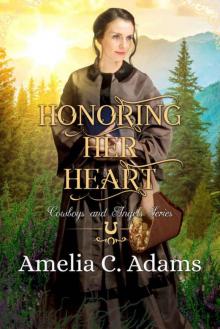 Honoring Her Heart
Honoring Her Heart Buttons and Bows
Buttons and Bows An Agent for Emily
An Agent for Emily Christmas Catch-Up VIII (River's End Ranch)
Christmas Catch-Up VIII (River's End Ranch)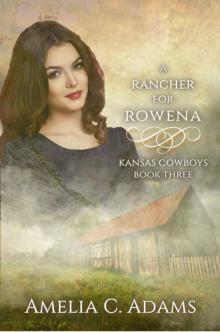 A Rancher for Rowena
A Rancher for Rowena Candice (Seven Sisters Book 6)
Candice (Seven Sisters Book 6) Butterfly Kisses
Butterfly Kisses A Stitch in Time
A Stitch in Time Buttons and Bows (The Sewing Circle Book 3)
Buttons and Bows (The Sewing Circle Book 3) Sidearms and Songbirds (Hearts of Nashville Book 3)
Sidearms and Songbirds (Hearts of Nashville Book 3) Herd to Breathe
Herd to Breathe The Ties That Bind
The Ties That Bind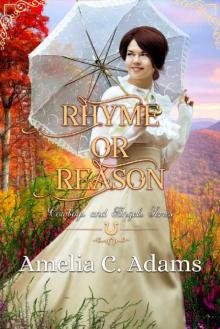 Rhyme or Reason
Rhyme or Reason Revelations (Brody Hotel Book 4)
Revelations (Brody Hotel Book 4) Phoebe's Fate (Burnt River Contemporary Western Romance Book 9)
Phoebe's Fate (Burnt River Contemporary Western Romance Book 9) And Something Blue (Main Street Merchants Book 1)
And Something Blue (Main Street Merchants Book 1)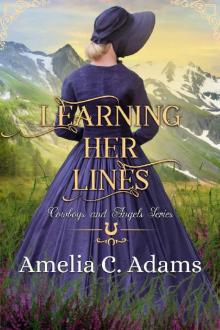 Learning Her Lines
Learning Her Lines Connections
Connections The Turn of a Wheel (Kansas Crossroads Book 17)
The Turn of a Wheel (Kansas Crossroads Book 17) Just Desserts (Main Street Merchants Book 4)
Just Desserts (Main Street Merchants Book 4) An Agent for Anna
An Agent for Anna An Agent for Esme
An Agent for Esme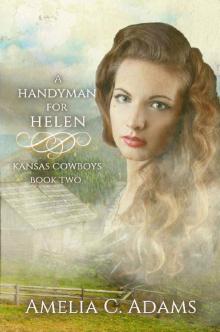 A Handyman for Helen
A Handyman for Helen Scented Sensibility
Scented Sensibility Addie's Adventurer
Addie's Adventurer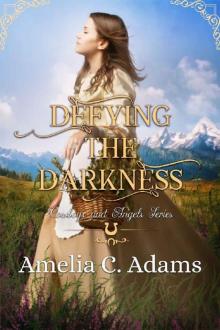 Defying the Darkness
Defying the Darkness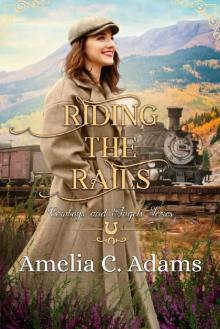 Riding the Rails
Riding the Rails Sugar And Spice (Main Street Merchants Book 7)
Sugar And Spice (Main Street Merchants Book 7) An Agent for Cynthia
An Agent for Cynthia In The Stars (Main Street Merchants Book 6)
In The Stars (Main Street Merchants Book 6)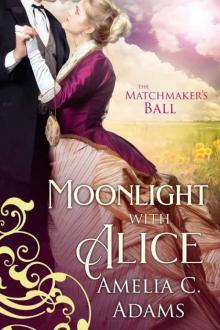 Moonlight With Alice (The Matchmaker's Ball Book 3)
Moonlight With Alice (The Matchmaker's Ball Book 3) Five Golden Rings (Main Street Merchants Book 3)
Five Golden Rings (Main Street Merchants Book 3) Between The Lines (Main Street Merchants Book 5)
Between The Lines (Main Street Merchants Book 5)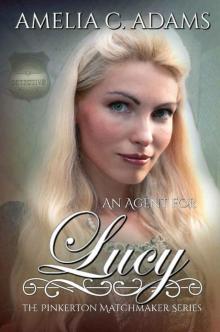 An Agent for Lucy
An Agent for Lucy Jessica (Seven Sisters Book 2)
Jessica (Seven Sisters Book 2)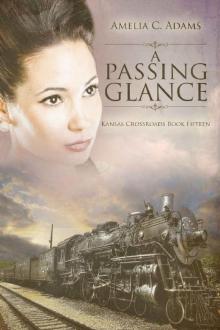 A Passing Glance
A Passing Glance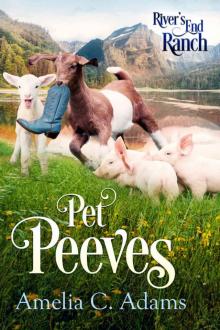 Pet Peeves
Pet Peeves RNWMP: Bride for Joel
RNWMP: Bride for Joel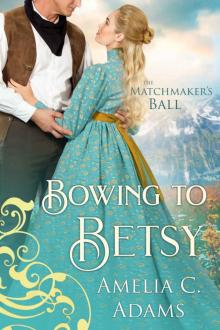 Bowing to Betsy (The Matchmaker's Ball Book 11)
Bowing to Betsy (The Matchmaker's Ball Book 11) Rebekah (Seven Sisters Book 4)
Rebekah (Seven Sisters Book 4) A Joyful Noise (Kansas Crossroads Book 14)
A Joyful Noise (Kansas Crossroads Book 14) Her Second Chance Hometown Groom
Her Second Chance Hometown Groom A Christmas Promise (Kansas Crossroads Book 16)
A Christmas Promise (Kansas Crossroads Book 16)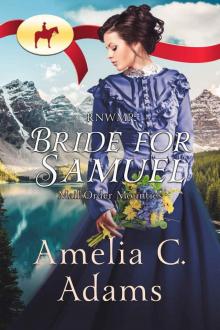 Bride for Samuel
Bride for Samuel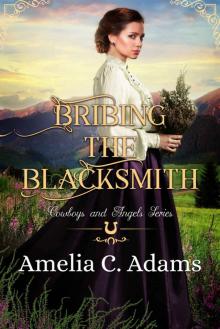 Bribing the Blacksmith (Cowboys and Angels Book 9)
Bribing the Blacksmith (Cowboys and Angels Book 9)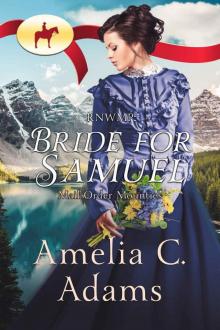 RNWMP: Bride for Samuel (Mail Order Mounties Book 12)
RNWMP: Bride for Samuel (Mail Order Mounties Book 12) Tea for Two
Tea for Two The Bitter and the Sweet (Kansas Crossroads Book 9)
The Bitter and the Sweet (Kansas Crossroads Book 9)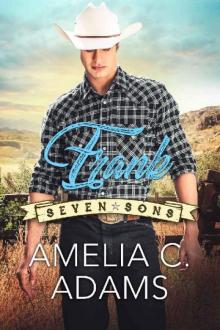 Frank (Seven Sons Book 6)
Frank (Seven Sons Book 6)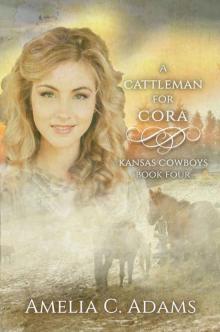 A Cattleman for Cora
A Cattleman for Cora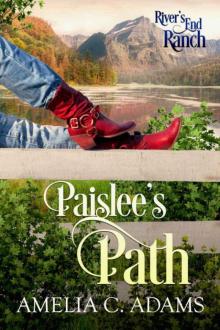 Paislee's Path (River's End Ranch Book 48)
Paislee's Path (River's End Ranch Book 48) Accidental Agent (River's End Ranch Book 3)
Accidental Agent (River's End Ranch Book 3)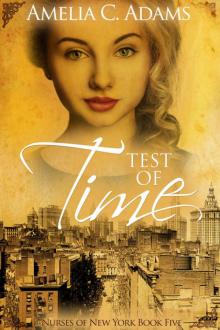 Test of Time (Nurses of New York Book 5)
Test of Time (Nurses of New York Book 5)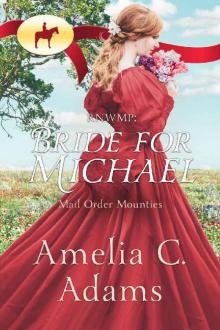 RNWMP: Bride for Michael (Mail Order Mounties Book 24)
RNWMP: Bride for Michael (Mail Order Mounties Book 24) Loving the Landlord
Loving the Landlord The Dark and the Dawn (Kansas Crossroads Book 3)
The Dark and the Dawn (Kansas Crossroads Book 3) Candy Crush
Candy Crush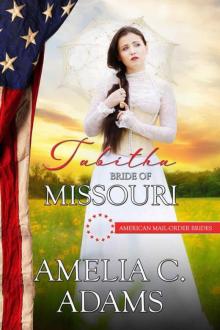 Tabitha: Bride of Missouri (American Mail-Order Bride 24)
Tabitha: Bride of Missouri (American Mail-Order Bride 24)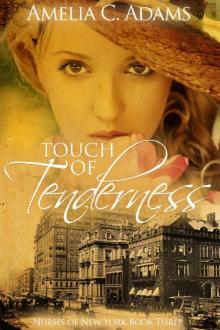 Touch of Tenderness (Nurses of New York Book 3)
Touch of Tenderness (Nurses of New York Book 3) Lucky Lifeguard (River's End Ranch Book 28)
Lucky Lifeguard (River's End Ranch Book 28) Heartstrings (Brody Hotel Book 2)
Heartstrings (Brody Hotel Book 2) Heart of Hearts (Nurses of New York Book 4)
Heart of Hearts (Nurses of New York Book 4) Hope_Bride of New Jersey
Hope_Bride of New Jersey A Careless Wind (Kansas Crossroads Book 7)
A Careless Wind (Kansas Crossroads Book 7) An Agent for Emily (The Pinkerton Matchmaker Book 28)
An Agent for Emily (The Pinkerton Matchmaker Book 28)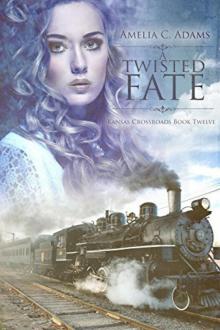 A Twisted Fate
A Twisted Fate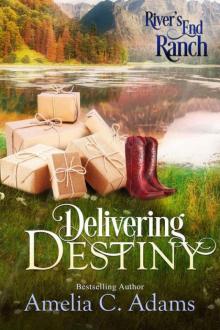 Delivering Destiny (River's End Ranch Book 23)
Delivering Destiny (River's End Ranch Book 23)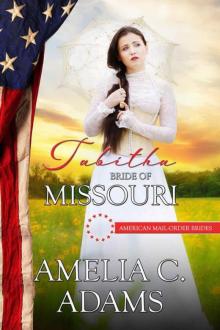 Tabitha_Bride of Missouri
Tabitha_Bride of Missouri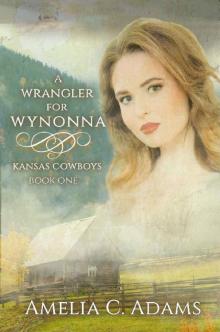 A Wrangler for Wynonna
A Wrangler for Wynonna RNWMP_Bride for Peter
RNWMP_Bride for Peter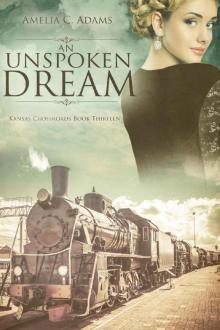 An Unspoken Dream (Kansas Crossroads Book 13)
An Unspoken Dream (Kansas Crossroads Book 13) Generations
Generations Utah Sunrise (Rocky Mountain Romances Book 1)
Utah Sunrise (Rocky Mountain Romances Book 1) Bride for Jonathan
Bride for Jonathan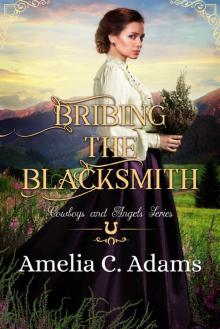 Bribing the Blacksmith
Bribing the Blacksmith A Clean Slate (Kansas Crossroads Book 4)
A Clean Slate (Kansas Crossroads Book 4) Hope: Bride of New Jersey (American Mail-Order Brides 3)
Hope: Bride of New Jersey (American Mail-Order Brides 3) Rugged Rockclimber (River's End Ranch Book 8)
Rugged Rockclimber (River's End Ranch Book 8)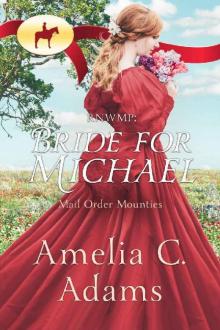 RNWMP_Bride for Michael
RNWMP_Bride for Michael RNWMP: Bride for Joel (Mail Order Mounties Book 4)
RNWMP: Bride for Joel (Mail Order Mounties Book 4) Tea For Two (Cowboys & Angels Book 15)
Tea For Two (Cowboys & Angels Book 15) Sweet Georgia Peach
Sweet Georgia Peach RNWMP: Bride for Peter (Mail Order Mounties Book 20)
RNWMP: Bride for Peter (Mail Order Mounties Book 20) A Clear Hope (Kansas Crossroads Book 5)
A Clear Hope (Kansas Crossroads Book 5) Meredith's Mistake (Grandma's Wedding Quilts Book 4)
Meredith's Mistake (Grandma's Wedding Quilts Book 4)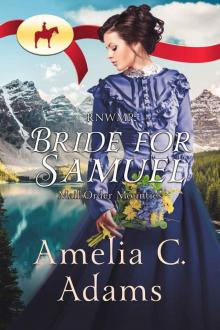 RNWMP_Bride for Samuel
RNWMP_Bride for Samuel The Whisper of Morning (Kansas Crossroads Book 6)
The Whisper of Morning (Kansas Crossroads Book 6) RNWMP: Bride for Jonathan (Mail Order Mounties Book 8)
RNWMP: Bride for Jonathan (Mail Order Mounties Book 8) Santa's Shopkeeper (River's End Ranch Book 18)
Santa's Shopkeeper (River's End Ranch Book 18) A Broken Wing (Kansas Crossroads)
A Broken Wing (Kansas Crossroads)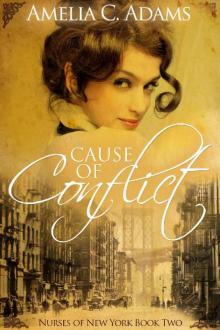 Cause of Conflict (Nurses of New York Book 2)
Cause of Conflict (Nurses of New York Book 2)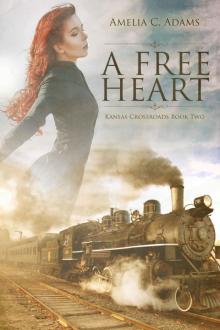 A Free Heart
A Free Heart A New Beginning
A New Beginning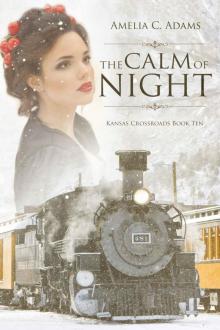 The Calm of Night (Kansas Crossroads Book 10)
The Calm of Night (Kansas Crossroads Book 10)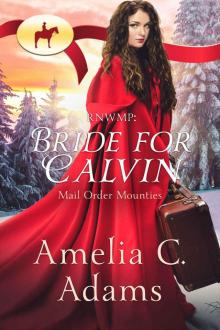 Bride for Calvin
Bride for Calvin Sea of Strangers (Nurses of New York Book 1)
Sea of Strangers (Nurses of New York Book 1)